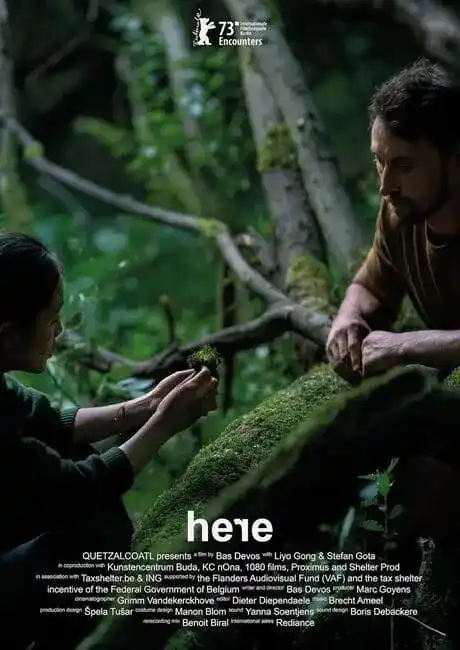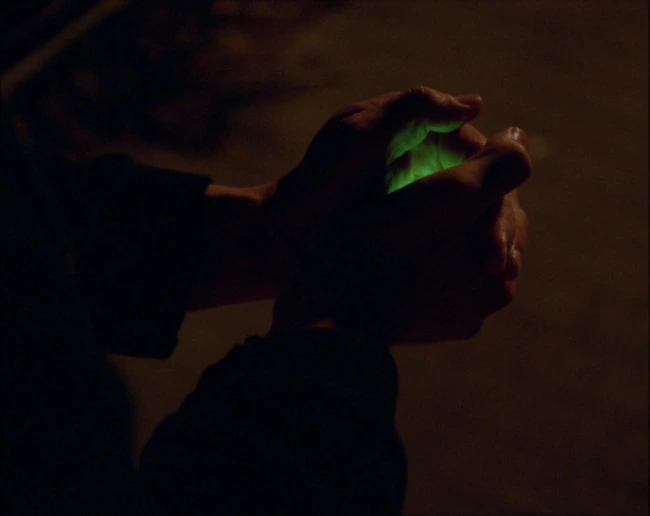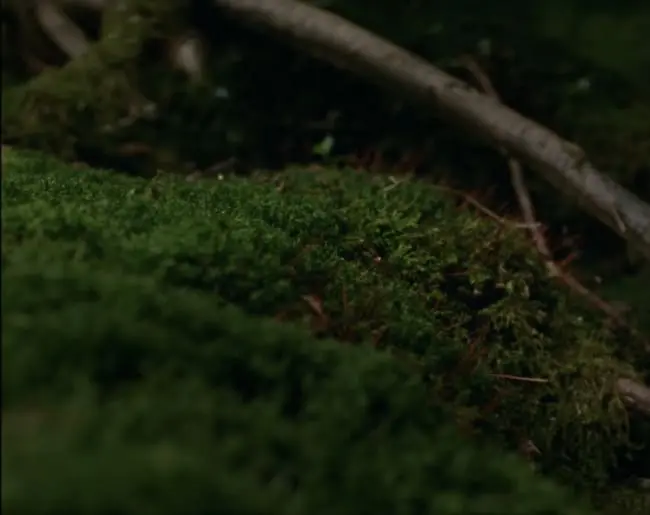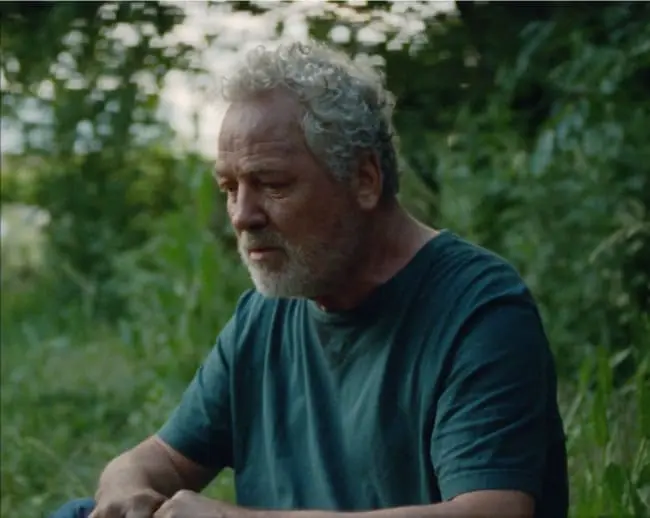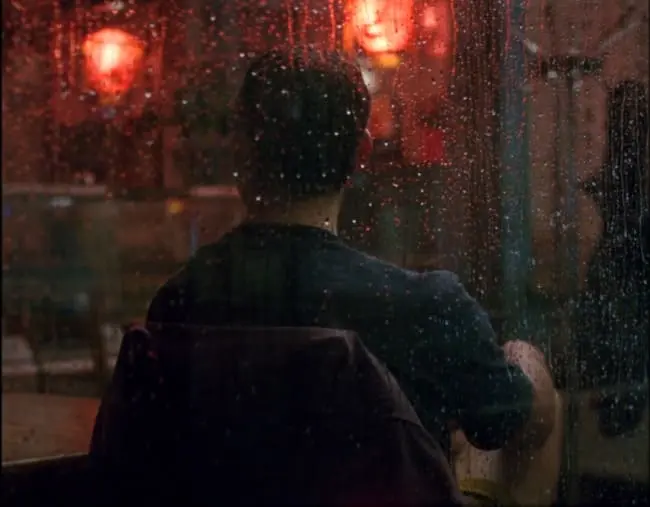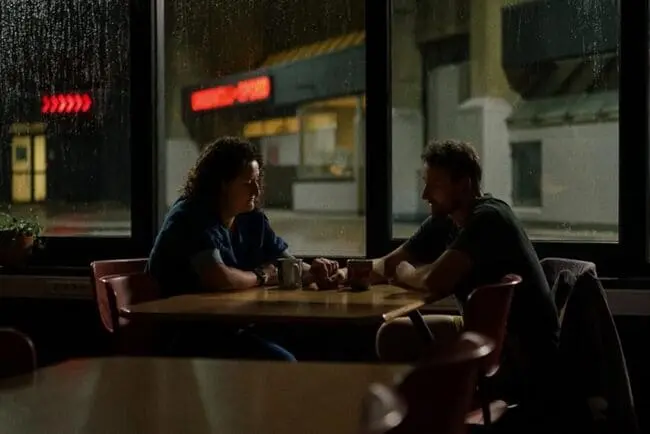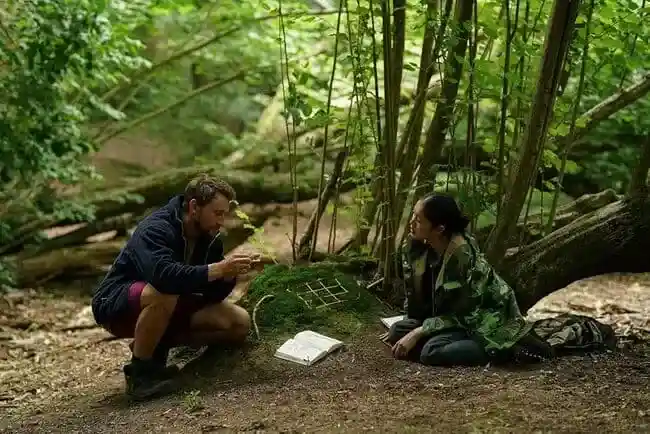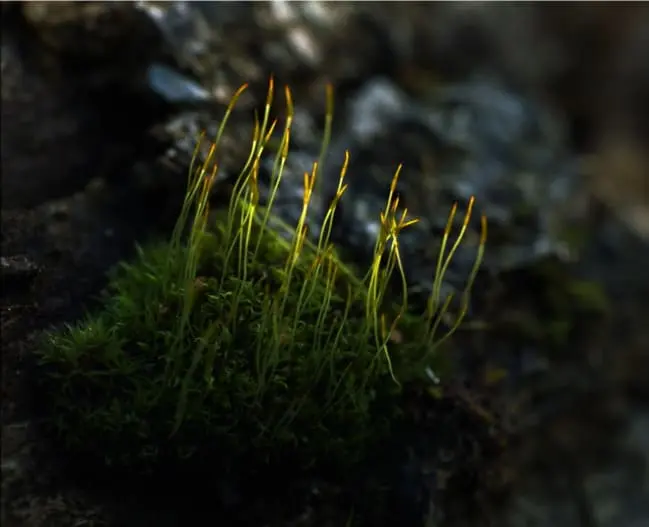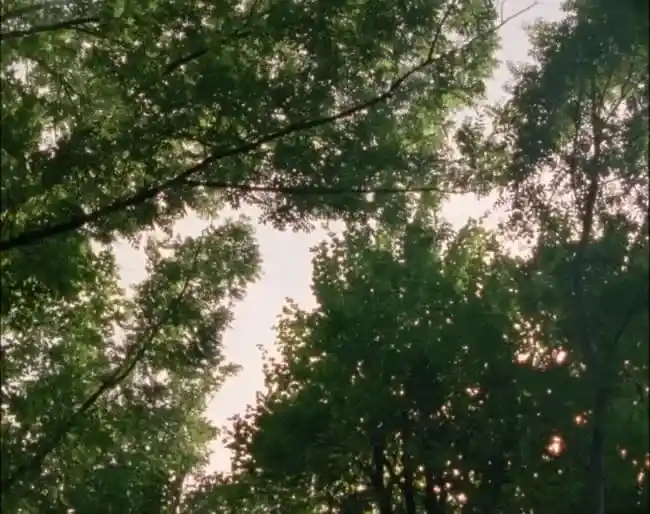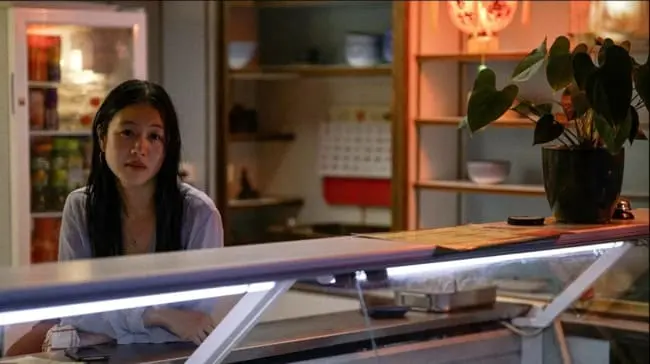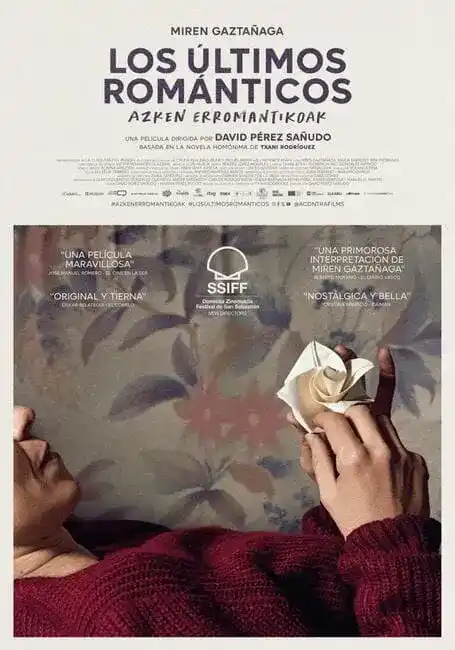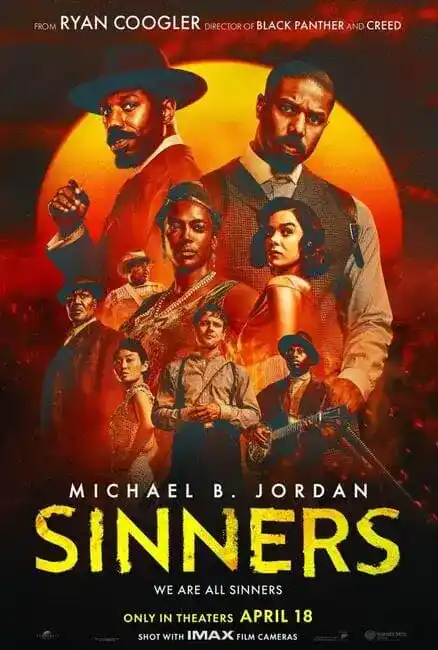Naturaleza y contemplación en el cine de Bas Devos.
En Here, Bas Devos profundiza su exploración de lo cotidiano a través de la naturaleza. La película se convierte en un espacio de contemplación donde el musgo, los árboles y los sonidos del entorno urbano revelan una poética silenciosa. Devos no impone una narrativa, sino que permite que el espectador respire junto a sus personajes, en un tiempo suspendido. Here es una invitación a mirar lo que normalmente ignoramos, a encontrar belleza en lo mínimo.
Los inicios del director belga Bas Devos fueron prometedores, resaltando su película “Violet” , de 2014. Cinco años después, en 2019, se reafirmó con dos obras consecutivas, “Hellhole” y, sobre todo, “Ghost Tropic”. Con “Here”, realizada en 2023, pero distribuida en 2024, ha alcanzado su obra más conmovedora, empleando la delicadeza y la sencillez como principales recursos. El filme obtuvo el premio a la Mejor película de la Sección Encounters, en el Festival de Berlín de 2023.
“Here” carece prácticamente de argumento, pero para entender mejor la intención de Bas Devos, consideremos Bruselas como el escenario principal. En esta ciudad, conocemos a Stefan (Stefan Gota), un joven inmigrante rumano que trabaja en la construcción y que, tras el fin de semana, tiene la intención de tomarse cuatro semanas de vacaciones para regresar a su país.
Con el fin de vaciar la nevera antes de su partida, decide preparar una sopa que regalará a familiares, amigos y conocidos. Por otra parte, está Shuxiu (Liyo Gong), una mujer joven de ascendencia china, quien se desempeña como docente de Biología e investigadora en la universidad, enfocando su labor en el análisis de los musgos. En su tiempo libre, colabora con su tía en un pequeño restaurante de comida china a domicilio.
Los primeros planos de “Here”, capturados con cámara fija, revelan una sutileza destacable, ya que entre los árboles se vislumbra un edificio en construcción junto a su grúa, acompañado del sonido de las máquinas. Esta imagen anticipa el contraste entre la naturaleza y el entorno urbano, o más precisamente, como propone Bas Devos con acierto, la simbiosis entre lo urbano y lo natural que se desarrollará a lo largo de la película.
En el interior del edificio, Bas Devos se enfoca en pequeños detalles, mientras en el fondo algunos obreros conversan, entre los cuales se encuentra, por el momento, de manera anónima, Stefan. Más adelante, Stefan adquirirá mayor protagonismo, apareciendo junto a dos compañeros en el autobús de regreso a casa, deseándose mutuamente unas felices vacaciones.
Stefan sufre de insomnio y, al no poder conciliar el sueño, se dirige a la nevera. Al percatarse de que debe utilizar los alimentos que tiene, antes de viajar a Rumanía, opta por preparar una abundante cazuela de sopa. Más tarde, durante la noche, se dirige a visitar a su amigo Cedric, quien trabaja como recepcionista en un hotel, entregándole un táper con una porción de la sopa que ha cocinado.
Ambos amigos conversan, revelándole Stefan, que ha recibido la llamada de la madre de un amigo (sin ella saber que Stefan se encuentra en Bélgica), pidiéndole que vaya a visitar a su hijo Marian que se encuentra en la cárcel. Stefan desvela a Cedric, la nostalgia que ha sentido de los tiempos de la infancia: los bosques, la casa de veraneo, las travesuras o atrapar luciérnagas (según avanza la película, Stefan en su insomnio, se volverá a lanzar a la calle y tomará entre sus manos una luciérnaga para observar su luz).
A lo largo de la conversación, se puede inferir que Stefan no se siente del todo satisfecho con su situación actual, mostrando vacilación cuando Cedric le pregunta sobre la duración de su permanencia en Rumanía. Es posible que su estancia se extienda más allá de las cuatro semanas que había planeado inicialmente. Este conflicto de desarraigo que enfrentan los emigrantes como Stefan es uno de los temas principales que se abordará en la película.
En un momento posterior, escuchamos la voz de una mujer con acento oriental, mientras el director nos muestra breves secuencias de trenes, patitos moviéndose entre arbustos, detalles de musgos e imágenes de árboles. Esta mujer sintió un intenso pánico al despertar, sin poder recordar las palabras que designaban los objetos a su alrededor, hasta que, pasado un tiempo, logró recuperarlas.
Sabremos que este episodio le ha ocurrido a Shuxiu, quien más tarde se nos muestra analizando musgos en su investigación en la universidad y, posteriormente, enseñando una clase de Biología en el mismo entorno.
Bas Devos alternará la cámara entre ambos personajes en su devenir diario. De este modo, hemos observado a Shuxiu en la universidad y en su regreso a casa, recolectando un poco de musgo que crece en la base de los edificios para analizarlo más tarde. Luego, la cámara se centra en Stefan, quien muestra interés por un huerto urbano comunitario, preguntando además a la cuidadora sobre el nombre de unas semillas que, posiblemente por el viento, acabaron en su bolsillo.
Más adelante, se le observa caminando hacia un taller de reparación de automóviles que pertenece a su familiar Mihai, interpretado por el actor rumano Teodor Corban. Stefan ofrece sopa a Mihai, quien la comparte con sus dos empleados. Juntos, inician una conversación en la que Mihai relata su peculiar experiencia al recibir un desfibrilador, describiendo las sensaciones extrañas que experimentó durante la anestesia y al despertar. Lamentablemente, se dio la triste noticia del fallecimiento de Teodor Corban tras finalizar el rodaje de la película (Bas Devos le dedicó la película).
En una escena nocturna de gran belleza, Bas Devos posiciona la cámara en el exterior de un pequeño restaurante chino, propiedad de la tía de Shuxiu, permitiéndonos observar a Stefan en su interior a través de la lluvia y el cristal mojado. Los dos protagonistas de la historia mantienen un diálogo cordial y ameno, aunque de alguna manera, todavía carente de intimidad.
Stefan visita a su hermana Anca (Alina Constantin) al hospital, quien se encuentra trabajando en jornada nocturna. Durante su conversación, abordan temas sobre su tierra de origen, la familia y los amigos, y Stefan expresa una vez más su sensación de agotamiento existencial, sugiriendo que su vida en Bélgica se ha vuelto repetitiva y monótona. Anca le consuela.
Stefan debe ir a recoger su coche del taller para partir hacia Rumanía, y decide caminar a través del bosque. En su trayecto, se encuentra inesperadamente con Shuxiu. Ante la sorpresa de este encuentro, Stefan le comenta su propósito, mientras que Shuxiu le revela que está investigando los musgos. Intrigado, Stefan observa las muestras que ella le enseña. A medida que avanza el día, la noche se aproxima y Stefan olvida por completo su coche. De este modo, se forja una conexión entre ambos jóvenes a través de la naturaleza, un tema central de la película.
Simultáneamente a la exploración y recolección de musgos por parte de los dos jóvenes, Grimm Vandekerckhove, captura impresionantes imágenes de diversos tipos de musgos, cada uno con características únicas.
Sin proporcionar más detalles sobre “Here”, es evidente que la relación entre los dos jóvenes transforma su forma de ver al otro. Es posible que Stefan no considere su situación actual como un futuro sombrío, gracias a la conexión que ha desarrollado con Shuxiu. De manera similar, aunque Shuxiu parece estar más adaptada a la vida urbana de Bruselas, se evidencia el lazo que ha establecido con Stefan. Sin embargo, al igual que en la vida real, Devos presenta un desenlace abierto.
Me interesa conocer algunas opiniones de Bas Devos en torno a su excelente película y acudo por ello, a diversas entrevistas, entre las cuales introduciré algunos detalles relevantes.
Maria Giovanna Vagenas interroga en Sense of Cinema a nuestro director. (Entrevista completa, aquí)
Es sugerente conocer el origen de la película en la mente de Bas Devos, y Maria Giovanna le inquiere al director, sobre ello:
- ¿Cuál fue la idea original detrás de Here? ¿Cómo empezó este proyecto?
- No hubo un punto de partida único y bien definido, sino varios puntos de partida que comenzaron a converger a lo largo del proceso. Estaba investigando y considerando la migración laboral en Bruselas, concretamente la migración laboral rumana, porque la ciudad tiene una comunidad rumana considerable. A pesar de que conocía a algunos rumanos, no pude comprender realmente el tamaño de este grupo de inmigrantes relativamente recientes. Esta investigación evolucionó en paralelo con mi lectura y exploración del mundo microscópico de las plantas más pequeñas, como los líquenes, el musgo y los hongos.
- Estaba fascinado e intrigado por cómo estas pequeñas plantas hablan de nuestros orígenes y nuestra relación con el mundo natural. Al principio, estos dos sujetos parecían ser algo independientes, y no estaba seguro de si alguna vez se cruzarían, pero pronto, muy gradualmente, comenzaron a moverse juntos. Además de esto, quería trabajar con Stefan Gota, que interpreta al personaje principal de la película.
- Jugó un pequeño papel en mi película anterior, Ghost Tropic. Intuitivamente sentí que quería trabajar con él, con la esperanza también de conocerlo mejor a través de esta colaboración. Para mí hacer una película también es una excusa para aprender cosas, para conocer gente y para sumergirme en un tema específico, especialmente al comienzo de un proyecto cuando la narrativa aún no está clara. El cine es una excusa para tener curiosidad y, a veces, una película puede surgir de esa curiosidad.
Uno de los aciertos de Bas Devos, es el empleo analógico del material cinematográfico. Así, al elegir el formato 4:3, casi obsoleto, en 16 mm. en lugar del cine digital, la película se muestra de forma auténtica y orgánica. Es claro que presenta sus desafíos, al no poder repetir las escenas, pero esa esencia del instante específico en el que se filma es lo que impulsa a Devos. Las tomas realizadas quedarán grabadas, por lo que el compromiso de los actores y del equipo técnico de la película debe ser absoluto. Muy apropiadamente, Maria Giovanna interroga al director, al respecto:
- ¿Podrías explicarnos por qué decidiste rodar en 16 mm?
- Creo que siempre es una pregunta interesante cuánta estética superficial puede tener una película. Hacer una imagen bonita, ya no es un reto. Tenemos cámaras digitales increíbles y puedes poner una gran pantalla LCD en el set, encuadrar algo, puedes poner la luz y puedes ver lo que estás haciendo. Cada imagen que veo está bien ejecutada y es hermosa. La estética de la superficie es solo una parte de esta elección.
- Para mí este proceso se vuelve muy interesante cuando empiezo a entender el aspecto temporal y espacial de un encuadre, cuando comprendo que podemos mostrar solo “esta” parte de un apartamento, por ejemplo, y me dirá lo mismo que 20 tomas de este mismo apartamento. Solo podemos mostrar este lado de Stefan, pero confío en que mostrará todos los diferentes lados de Stefan.
- En términos de tiempo de rodaje, el uso de película es una limitación…
- Sí, y hay que pensarlo bien. Puedes filmar sin cesar con la cinematografía digital. Puedes filmar la misma secuencia una y otra vez. Esta es la razón por la que la cinematografía digital puede tener tanto un lado hermoso como uno peligroso. Hay, en mi opinión, grandes ejemplos de cineastas que han dominado la cinematografía digital y la han utilizado a su favor, terminando con cosas que antes eran inimaginables. También veo su belleza. Pero todavía estoy un poco, no de una manera nostálgica, enamorado de esta idea de la concentración.
- Me gusta decir: “Oye, todos estamos aquí ahora. Hagámoslo. ¡Aprovechemos este momento!” Además, todavía me da mucho placer saber que lo que acabamos de rodar estará en la película. No es algo que se vaya a eliminar. No es algo que vaya a desaparecer, o que se vaya a cortar en un millón de pedazos. No vamos a hacer la película en el montaje. Lo enfrentaremos en la edición, pero no lo lograremos en la edición. ¡Está hecho aquí, ahora mismo!
Una de las escenas más curiosas de “Here” ocurre cuando nuestra bióloga, en medio del entorno urbano, se detiene para recolectar un pequeño musgo que crece en la base de un edificio.
- Muestras con sensibilidad la resiliencia del mundo vegetal en la ciudad. Hay una breve escena en la que Shuxiu, la protagonista femenina, ve crecer un poco de musgo en una acera en el centro de Bruselas y lo recoge con cautela. La belleza de una planta que crece en el asfalto es muy reveladora para mí. ¿Qué significa para ti la convivencia de la naturaleza y el paisaje urbano?
- Estamos profundamente conectados con el mundo vegetal, sin embargo, el llamado desarrollo tecnológico hace que a menudo no seamos conscientes de este vínculo crucial. Parte de mi investigación y mi interés en esta película fue el hecho de que hay una especie de mundo verde omnipresente pero invisible en nuestras ciudades. Necesitas prestarle una atención renovada, ser consciente de ello pero, una vez que comienzas a percibirlo de nuevo, lo ves en todas partes y realmente te llama la atención su presencia constante.
- No creo que sea algo profundo. De hecho, es bastante obvio. Sin embargo, me quedé asombrado cuando me di cuenta de cómo cambió mi propia percepción de la ciudad una vez que comencé a notar que el musgo crecía por todas partes. El musgo es una planta muy resistente. Crece en los lados de los edificios de la misma manera que crecería en los acantilados en áreas rocosas. Es interesante ver estas analogías entre las estructuras hechas por el hombre y la naturaleza. Una vez más, es muy poco espectacular, pero es mágico estar un poco en contacto con esta noción de interconexión.
- Supongo que también es una razón por la que tanta gente se siente atraída por la literatura que revaloriza nuestra conexión con el mundo natural. Por ejemplo, se ha escrito mucho sobre cómo funcionan las redes de hongos, lo que permite que las plantas se comuniquen entre sí hasta cierto nivel. A veces tal vez antropomorfizamos o leemos demasiado en él. Sin embargo, esta investigación nos habla de un mundo que en cierto modo olvidamos, pero con el que estamos en sintonía.
Una buena parte de Here se sucede en la noche y sentimos curiosidad por esta predilección por los ambientes nocturnos. La periodista le pregunta sobre esto.
- La noche es un elemento crucial de la narrativa de tus películas. Stefan, el personaje principal de Here, es un insomne. ¿Qué es lo que más te intriga de la noche?
- Estoy muy interesado en cómo la percepción y la experiencia vivida pueden alterarse y cambiar una vez que te mueves hacia la noche. De hecho, hay dos sueños o secuencias oníricas en la película, pero nunca los traté conscientemente así mientras escribía. Me interesaba más la imagen poética de alguien que no puede dormir y se pierde por la noche. Mientras deambula por las calles, la mente también comienza a ver cosas y a alterarlas inconscientemente, sorprendiéndonos de maneras extrañas.
- Piense, por ejemplo, en la forma en que alguien puede leer algunos letreros solo porque no están bien iluminados. Todo se convierte en un truco de la mente en cierta etapa y ves cosas que realmente no están allí. En mi opinión, esta condición alterada de la percepción y los sentidos es increíblemente cinematográfica. Sin pensarlo demasiado, es algo que trato de entretejer en mis películas porque me gusta el equilibrio entre la realidad y una sensación profundamente subjetiva o expandida de la misma, una realidad que cambia, que es fluida y cambia ante nuestros ojos.
- Me gusta pensar que los sueños o las pesadillas son reales, y una película para mí es una forma de hacerlos sentir reales. Eso es algo que me impulsa.
A lo largo de la película, se producen cortes bruscos, en los que se transita de unos planos a otros sin aparente relación. Bas Devos entiende que el cine es como la literatura, y lo mismo que en un libro leemos una página con una atmósfera determinada, la siguiente página no tiene por qué guardar relación con la anterior. Pero antes de que el director hable sobre ello, la periodista le pregunta en torno a la atmósfera onírica que se produce en algunas escenas de Here, en concreto refiere la charla de los dos hermanos en el hospital.
- Hay una secuencia maravillosa en la que el protagonista se encuentra con su hermana por la noche en la cafetería del hospital donde trabaja y, de repente, nos encontramos en un bosque. Hace sol, pero también llueve, y la cámara se desliza de una manera alta y sofisticada, en el aire y de vuelta a la tierra. Después de un corte repentino, Stefan le dice a su hermana: “Lo siento, me quedé dormido…” Esta secuencia dice mucho en términos de una realidad onírica en Here. ¿Estás de acuerdo?
- ¡Sí, absolutamente! Escribí una escena en el hospital, el lugar de trabajo de la hermana del protagonista. Tenía la idea de que Stefan le pediría que hablara y luego se quedaría dormido porque precisamente por eso quiere que ella hable, para calmarse y salir de sus propios pensamientos. Me imaginaba, ¿qué pasa si ella cuenta una historia que no es una historia en absoluto? ¿Y si habla del bosque?
- En lugar de decir: “¡Oh, el hospital está tan lleno y hay tantos enfermos!”, ella decía: “Cae la lluvia y estamos en un bosque y brilla el sol…” Y entonces pensé que solo quería convertir todo esto en una imagen concreta y filmar una secuencia onírica sobre los árboles. Su historia y su sueño de alguna manera se mezclan y se convierten en otra cosa.
- Hay muchos cortes en el montaje que nos llevan bruscamente de un lugar a otro; El hecho de que de repente estemos en un bosque, me pareció muy natural.
- Eso era lo que esperaba, pero puedo imaginar que mucha gente leería esta secuencia en retrospectiva como una especie de sueño, mientras que para mí, fue simplemente agradable saltar de un hospital por la noche a un bosque extraño durante el día. Gran parte de mi placer mientras hago una película proviene de este tipo de pensamientos.
- Haciendo una analogía entre la literatura y el cine, un buen corte para mí es como cuando pasas una página de un libro. Imagina una bonita frase al final de un capítulo, luego pasas la página y hay una nueva frase, una nueva imagen y un nuevo capítulo. Un buen corte es como pasar una página y comenzar un nuevo capítulo. ¡Espero que funcione así en la película!
Al hilo de lo anterior, la mayoría de los planos rodados en la película, están realizados con una cámara fija, estática. Bas Devos argumenta que no siente necesidad de mover la cámara caprichosamente, e incluso si dispusiera de más medios, lo volvería a rodar de la misma manera.
- Utilizas principalmente planos estáticos, que, como acabas de señalar, tienen la sensación de “una página”.
- Me resulta muy difícil pensar en el movimiento de una cámara si no entiendo por qué la cámara se mueve. A menudo, solo hay una razón dinámica para que la cámara se mueva. Cuando un personaje está caminando, siempre es muy agradable si la cámara ajusta su tempo a la figura que camina. Luego, por supuesto, hay pasos más poéticos en los que un movimiento de cámara realmente puede transportarnos y donde se vuelve significativo porque muchas otras tomas son, de hecho, estables.
- Pero en general, mientras veo películas, a menudo no entiendo por qué la cámara se comporta de la manera en que lo hace. Siempre quiero hacerlo lo más simple posible, como un decoupage, en cierto modo. Si quiero acercarme, porque hay algo que quiero ver más cerca, entonces hago un primer plano y si, por el contrario, me parece interesante entender el contexto, me quedaré a cierta distancia. Hay un cierto desarrollo en el uso de los movimientos de cámara en mis películas, pero hay una especie de, digamos, alegría continua al encontrar un marco hermoso o, más precisamente, el marco correcto.
- Una vez que encuentro el encuadre correcto, si no siento una razón para que la cámara se mueva, no creo que la cámara deba moverse. Incluso si tuviera todo el dinero del mundo y una grúa a mano, o algo por el estilo, todavía no lo usaría porque creo que un movimiento de cámara es el momento en que una cámara está imponiendo una cierta narrativa, ya sea una narrativa emocional o simplemente está agregando un aspecto adicional a una escena. A menudo siento que no necesito eso y, por lo tanto, incluso si tuviera los medios, seguiría manteniendo el marco estático.
Es cierto que la cámara permanece estática en buena parte de las escenas y planos del filme, y muy a ras de suelo al tomar los planos de los musgos, porque como bien afirmaba Bas Devos, se bajó al suelo para descubrir los minúsculos musgos y las hierbas, que anteriormente le pasaban desapercibidos, hasta descubrir este mundo minúsculo que orbita tanto en los bosques como en partes de la ciudad.
Sin embargo, también es cierto que se producen algunos movimientos de cámara, en las caminatas, tal como explica Bas Devos, entre las que incluye en más de una ocasión, unos contrapicados muy hermosos de las copas de los árboles.
El sonido en la película juega un papel fundamental. Se registran tanto los ruidos urbanos como los elementos naturales presentes en la ciudad, incluyendo el canto de los pájaros y el susurro del viento. Esta dimensión sonora cobra especial relevancia cuando los personajes se adentran en el bosque.
- Durante las conversaciones, el sonido ambiental se mantiene bajo, creando una atmósfera muy íntima; Además, usas solo unas pocas partituras musicales. ¿Cómo trabajaste en el paisaje sonoro de la película?
- Me resulta muy agradable cuando se hace el silencio en una sala de cine, cuando estoy rodeado de mucha gente y estamos viendo esta pantalla gigante, la luz que cae sobre ella y luego se queda en silencio y podemos escuchar todos los detalles. Hay algo muy atractivo en ello. Me gusta el hecho de que, en lugar de la imagen, es el sonido en primer lugar lo que te hace consciente del hecho de que no estás viendo esto solo. Para mí, también aumenta la sensibilidad y la intimidad con tu entorno inmediato.
- Siempre he tratado de reproducir un poco este tipo de sensación en mis películas. Cuando hice mi primera película, recuerdo haber visto a un chico que venía a la proyección con un gran cubo de palomitas de maíz. Al final de la película, todavía tenía un cubo lleno de palomitas de maíz. No se atrevió a comerlo porque habría hecho demasiado ruido. Me pareció muy bonito. Significaba que era realmente consciente de su propia presencia durante la película, lo que no sucede tan a menudo.
- A menudo nos sentimos abrumados por la imagen y el sonido, por la idea de una experiencia inmersiva, que es algo que también disfruto, pero me conmueve de verdad cuando, de repente, me doy cuenta de mi propia presencia. Una película “tranquila” tiene este efecto inmediato para el público, supongo.
En cuanto a la música extradiegética en “Here”, se puntualiza con unas pinceladas musicales muy sutiles, compuestas por Brecht Ameel. Por ejemplo, Shuxiu, revela que su color es “verde”, y Brecht, compone una pieza muy bella, para ese instante.
Mención especial merece la fotografía. El responsable, Grimm Vandekerckhove, realiza un trabajo verdaderamente destacable, pues se añadía la dificultad de mostrar de la manera más fiel posible, la naturaleza minúscula de los musgos.
En lo que respecta a la dirección de actores, Bas Devos logra que los intérpretes actúen de forma natural, similar a como lo haría cualquier persona común, incluso incorporando a algunos personajes que no son actores profesionales. Bas Devos ofrece una explicación más detallada en otra entrevista. En esta ocasión, Leonardo Goi es quien entrevista a nuestro director en Film Comment (entrevista completa aquí).
- ¿Podrías hablarnos de la dirección de actores? ¿Esperas que sigan el guión al pie de la letra o dejas suficiente espacio para la improvisación?
- No hay una respuesta única porque creo que cambia de un actor a otro, y de una escena a otra. Aquí, la escena en la que Stefan y Liyo se conocen por primera vez en el restaurante chino es una especie de híbrido. El comienzo es todo improvisación, porque quería que Stefan hablara libremente y tropezara si tenía que hacerlo.
- Para la última sección, quería algo más guionizado. Stefan no es un actor completamente entrenado, y Liyo nunca antes había estado en una pantalla: es editora de cine y ha trabajado con Wang Bing, entre otros. Pero trabajar con ellos fue muy agradable: ambos eran muy generosos y no tenían miedo. Aun así, hay momentos, especialmente cuando se trabaja con actores no profesionales que tienen mucho miedo a la cámara, cuando el ensayo se convierte en una sesión de terapia, y me encuentro tranquilizándolos.
- Por ejemplo, Alina Constantin, la mujer que interpreta a la hermana de Stefan, Anca: es una señora de la limpieza en la vida real, y para mí fue el mayor descubrimiento de la película. Es increíble, y está muy a gusto. Pero no tengo un método, estrictamente hablando. Hablo mucho con mis actores, y una vez que se sienten cómodos, a menudo salen cosas hermosas. Puede haber momentos en los que te des cuenta de que hay límites que no puedes superar. Es natural; Después de todo, la cámara es un arma, y apuntar a alguien y esperar que actúe con naturalidad no solo es paradójico, es un acto violento.
El componente de la sopa desempeña un papel en la socialización, ya que al compartir la sopa que ha preparado, Stefan fortalece sus lazos de amistad con Cedric, los integrantes del taller, su hermana y Shuxiu. Además, la distribución de la sopa simboliza el retorno al hogar de origen de Stefan, lo cual, según nos relata Bas Devos, fue la base inicial de “Here” (En la entrevista anterior, se indagó sobre el origen de la película, destacando que su base inicial fue la emigración.
Sin embargo, en esta ocasión, se menciona la sopa como una forma de abordar el tema de la emigración de manera menos dolorosa.).
- ¿Cuál fue la chispa inicial que te llevó a escribir?
- ¡La sopa! [risas] Me sentía abrumado por esta idea de la historia de la migración; Había tanto peso y tanta violencia detrás. No sabía qué hacer con él. Pero algo que se repetía mucho en mis conversaciones con los rumanos que conocí en Bruselas era su inquebrantable creencia de que un día todos volverían a casa, que construirían una casa en Rumanía y se retirarían allí. Eso es algo que los diferencia de otras comunidades de migrantes en la ciudad; para ellos, estar en Bruselas es solo un estado temporal, sin importar los lazos que han desarrollado.
- Un símbolo de eso para mí fue el refrigerador: vaciar y apagar el refrigerador antes de salir de un viaje largo. Eso desencadenó la idea de que Stefan usara todas sus sobras para hacer una sopa. Una vez que tuve eso, supe que había encontrado mi primera escena.
En conclusión, y para evitar extender en exceso el artículo, es importante señalar que, en un primer momento, podría parecer poco creíble que un obrero y una bióloga pudieran establecer una conexión entre sí. Stefan, un emigrante que no se termina de ubicar en una ciudad extranjera y que tal como plantea inicialmente, sugiere que su regreso a Rumanía podría ser definitivo. En este sentido, Bas Devos aborda el tema del exilio sin dramatismos excesivos, presentando el conflicto de manera sutil y natural.
Por otro lado, Shuxiu, aunque proviene de una familia de emigrantes, es una bióloga consolidada que se dedica con pasión al estudio de los musgos, dedicando horas de trabajo a esta actividad y realizando excursiones por el bosque en sus días libres. Sin embargo, también se percibe en ella un sentido de soledad que parece haberse prolongado en el tiempo, ya que su única interacción social se limita a sus alumnos y a su tía, con quien comparte un pequeño negocio.
La aparente complejidad de la conexión entre dos individuos que parecen ser opuestos puede ser facilitada por la naturaleza. Stefan, quien tiene una profunda afinidad por el bosque, un lugar que evoca sus recuerdos de infancia, se encuentra con Shuxiu, quien considera ese entorno como un verdadero paraíso. El musgo, una de las plantas más antiguas y resilientes del planeta, actúa como un vínculo entre estos dos personajes que buscan un apoyo emocional para redescubrir el sentido de sus vidas. Además, la sopa se convierte en un símbolo que fortalece su relación.
La creación de Bas Devos se destaca como un refugio en un entorno cinematográfico saturado de obras tensas, evocando emociones universales que son a la vez sencillas y auténticas. Las imágenes que presenta ofrecen una serenidad y calma indispensables para huir del ruido diario. En su esencia, invita a sentarse y contemplar, al igual que los personajes, valorando la belleza de lo simple y lo pequeño, como las hierbas y los musgos.
Bas Devos continúa consolidando una filmografía que desafía las convenciones narrativas. “Here” es una muestra de su sensibilidad única.
La película la podéis disfrutar en Filmin.
Imágenes promocionales de la película, pertenecientes a las compañías © Quetzalcoatl y © Rediance. (Agradecimientos).
Complementos de apoyo en el artículo: las indispensables entrevistas de © Maria Giovanna Vagenas en Sense of Cinema y de © Leonardo Goi en Film Comment. (Agradecimientos).
